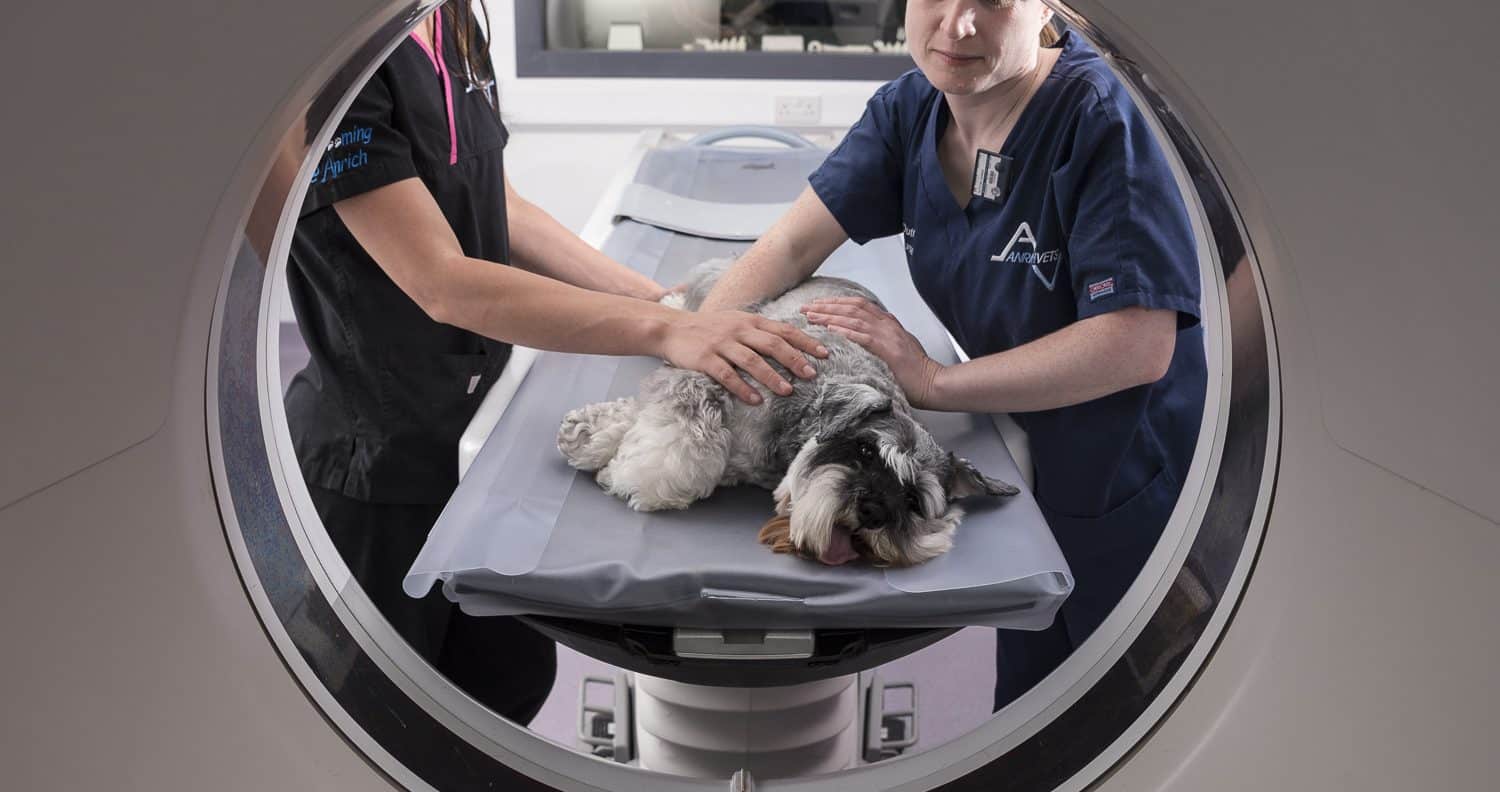As a pet owner, you know your pet best, and should always discuss any marked changes in your dog with your vet. One of the most common signs of brain tumours in dogs is a seizure. Seizures can be accompanied by other changes. Whilst diagnosis can only be achieved through a CT or MRI scan, with a possible follow-up biopsy, your report of changes in behaviours, will give your vet valuable information to help towards a diagnosis.
How Do I Know if My Dog Has a Brain Tumour?
Other than seizures, certain behavioural changes can occur with brain tumours. These include changes in personality, lethargy, vacant episodes, circling, and wobbliness. If your dog is exhibiting any of these signs along with seizures, then your vet may well suspect that your dog has a tumour of the brain.
What Are The Symptoms and Signs?
Seizures are the most common signs of a tumour on the brain, these will continue to occur, not simply be a one-off incident. The seizures occur due to the tumour pressing on specific areas of the brain. Having seizures does not automatically mean that your dog has a tumour on his or her brain, but when combined with other symptoms, it can give an indication of possibility. Your vet will always investigate thoroughly to find the root cause of your dog’s seizures.
Are Dogs in Pain with a Brain Tumour?
Pain can occur due to the fluid build up around the tumour in the brain, due to the location of the tumour, or from the symptoms that develop. When we treat dogs with brain tumours, we always aim to ensure that they have a good quality of life, not just extend their life. We can prescribe painkillers to help keep your dog comfortable and pain-free.
How Long Can Dogs Live with a Brain Tumour?
Sadly, the prognosis for brain tumours in dogs is not excellent. Our aim in treatment is to give the dog a good quality of life for the time that they have left. All medications routes will give the dog more time, though it will vary depending on the type of treatment and the severity of the tumour. Remission times vary from a few months to around 20 months. We will always discuss the options very clearly with you, and weigh up the risks and benefits. Our priority is always to ensure a good quality of life, over quantity, for your pet.
What Are The Causes?
If your dog is diagnosed with a tumour on the brain, it can be easy to feel guilty or think that you could have done something to prevent it. Sadly, a tumour on the brain is not a preventable disease. Certain canine breeds are more prone to brain tumours, including Boxers and Golden Retrievers, so if you are buying a puppy make sure that you choose one from a reputable breeder, and ask about the family health of the puppy. Obviously, it is sensible to keep your dog fit and healthy with a good diet and regular exercise.
Diagnosis
Whilst your vet may suspect a brain tumour based on the presenting signs and symptoms, a conclusive diagnosis is gained through a CT scan or ideally an MRI scan. These digital imaging modalities may show any masses or tumours on the brain, though they cannot show what type of brain tumour is present. A biopsy will be able to determine the type of tumour, however, if surgery is already planned to remove the mass on the brain, then a sample can just be taken during the brain surgery and a separate procedure will not be required.
Treatment
The best treatment for your dog will be based on his or hers circumstances. Each case is different and so the treatment will vary. It will depend upon the location of the brain tumour, the size of the tumour, how deep inside the brain the tumour is, and the age and general health of the dog. We will always discuss the different treatment options with you thoroughly and advise on the best course of treatment for your dog. Each treatment will have risks and benefits and these need to be carefully considered, to ensure that we maintain a good quality of life for your dog.
Some brain tumour in dogs are best treated with medication alone, typically corticosteroids which will alleviate symptoms, and can give your dog respite for a few months. Radiation treatment can work well where the tumour is deep-seated in the brain, and surgery would be too dangerous. Radiation treatment works better than chemotherapy treatment for brain tumours, as the brain is very well protected, and it is difficult for chemotherapy to penetrate through to the tumour. Radiation treatment can give a good period of remission for many dogs, for up to 14 months. The polytherapy treatment, which is considered the gold standard treatment for humans, uses a combination of surgery, radiation, and medication, and gives the longest remission, lasting up to around 20 months. Surgery is only an option where the brain tumour is not too deeply seated, and the dog is considered healthy enough to withstand the operation.
Recovery
Recovery from surgery will be discussed during consultations, to ensure that owners can help to support and care for their dog fully during the recovery period. The length of recovery will depend upon the severity of the surgery and the placement of the brain tumours in dogs.
Northwest Referrals are Here to Help
If you are a vet looking for a professional MRI scan for your patient, or you are a pet owner who would like further investigation from our experienced veterinary team, then we can help. Our state-of-the-art surgery and facilities include an MRI as well as a CT scanners, which will help to establish a conclusive diagnosis. To learn more, visit our CT Scanning page, or simply call us on 01942 242001
Read the related article: Do Dogs Get Dementia?


